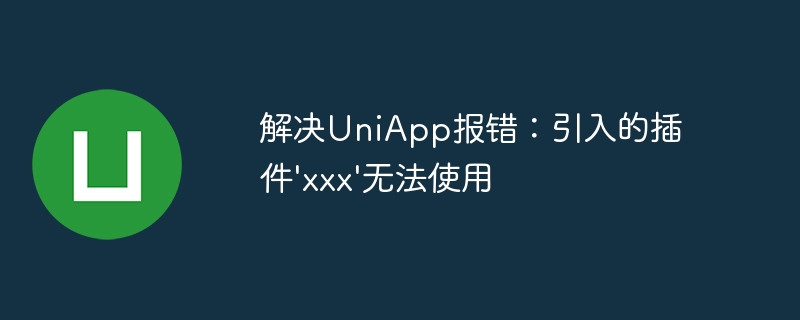

UniApp is a popular cross-platform application development technology. It has the characteristics of high development efficiency, low maintenance cost, and good compatibility. It is widely used in the development of mobile applications. in process. However, there are also some common problems during the development process using UniApp, such as the introduced plug-ins cannot be used. So, how to solve this problem? This article will introduce readers to the following aspects.
1. Check the plug-in version and compatibility
When using UniApp to introduce a plug-in, you need to confirm whether the plug-in version is compatible with the version currently used by UniApp. If the plug-in version is too low or too high, it may cause the plug-in to be unusable. Therefore, before using the plug-in, you need to carefully check the official documentation of UniApp and the plug-in to confirm whether there are compatibility issues between them. At the same time, you also need to pay attention to the update of the plug-in and update the plug-in to the appropriate version in time to avoid unstable use due to plug-in version problems.
2. Check the plug-in reference method
In UniApp, there are many ways to introduce plug-ins, such as using the npm install command, manually citing plug-in files, etc. If the plug-in is not introduced correctly or the reference method is incorrect, the plug-in will also become unusable. During use, you need to carefully check whether the files required by the plug-in are correctly referenced, whether the reference path of the plug-in is correctly configured, etc.
3. Check plug-in code issues
Sometimes the reason why a plug-in cannot be used may be that there is a problem with the plug-in code. For example, there are syntax errors in the plug-in, problems with the plug-in code logic, etc. Before using the plug-in, you can first check whether the plug-in code is correct. If you do not have the relevant technical capabilities, you can report the problem to the plug-in maintainer, who will fix it.
4. Check the UniApp configuration problem
If there is no problem with the plug-in code, then it may be a UniApp configuration problem. UniApp has many configuration files, such as manifest.json, etc., and there may be configuration errors in them. You need to carefully check the relevant configuration files to ensure that the plug-in configuration matches the UniApp configuration file. If the problem still cannot be solved, you can ask questions in the UniApp developer community and receive professional technical support.
5. Use other plug-ins to solve the problem
If the above methods cannot solve the problem, you can consider using other plug-ins to replace the original plug-ins to achieve the same function. Currently, UniApp has a very rich plug-in market, and various types of plug-ins can meet different development needs. If you are familiar with the use of other plug-ins on the market, you can also use other plug-ins to replace the original plug-ins to avoid using unstable plug-ins.
To sum up, to solve the problem that the plug-in introduced by UniApp cannot be used, you need to carefully investigate the cause of the problem and adopt different solutions. For developers, mastering these problem-solving skills can improve development efficiency, reduce development costs, and better complete mobile application development tasks.
The above is the detailed content of Solve UniApp error: The introduced plug-in 'xxx' cannot be used. For more information, please follow other related articles on the PHP Chinese website!




